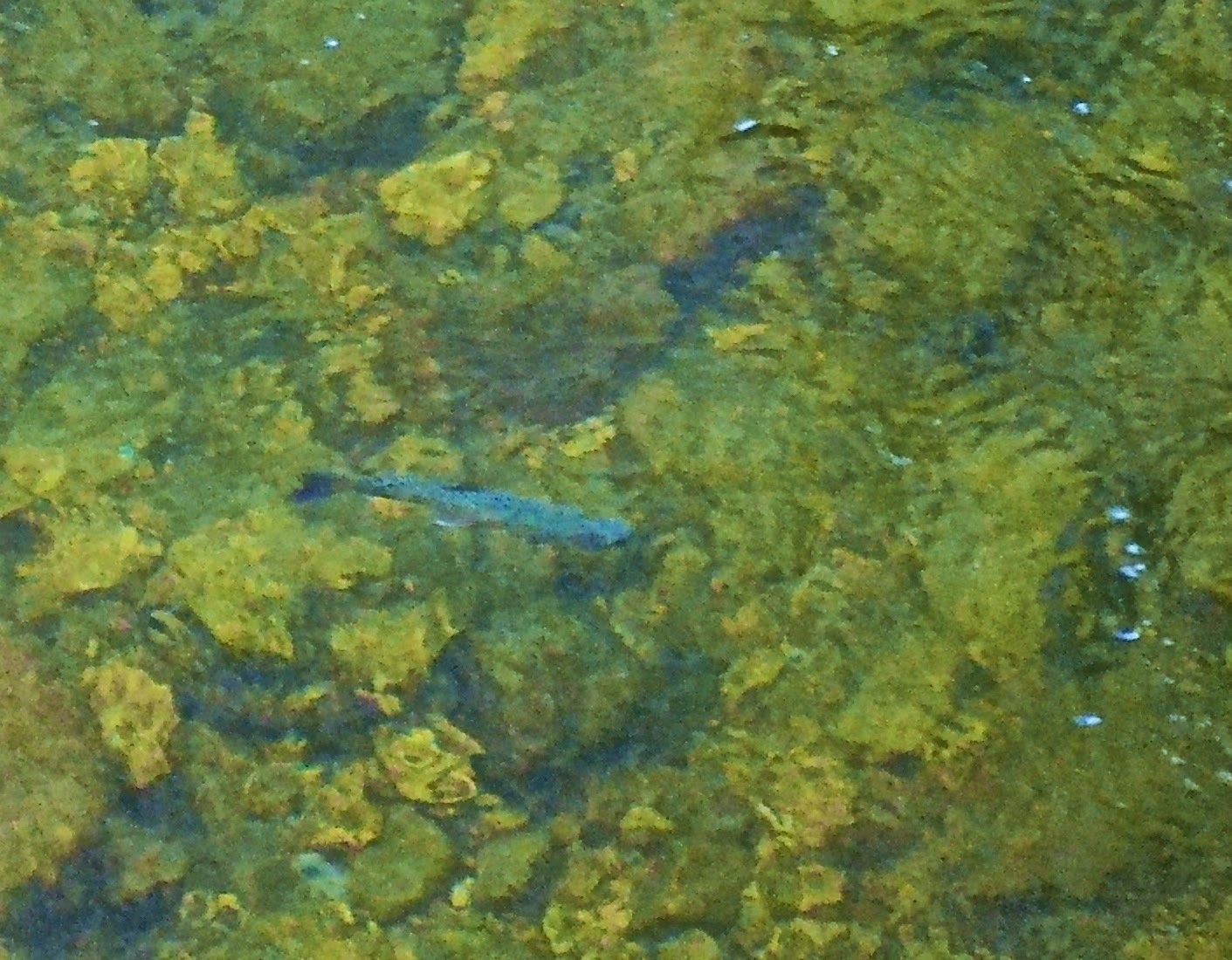Henry Bugbee
- Henry Bugbee, The Inward Morning. Don't try to read this book quickly, and if you're not prepared to do the hard work of thinking, move on and read something else. But if you're willing to read slowly and thoughtfully, this book can change your life. Bugbee was a philosophy professor and an angler.
- Henry David Thoreau, A Week On The Concord and Merrimack Rivers; The Maine Woods. Thoreau was an occasional angler, and an observer of anglers.
- Aldo Leopold, A Sand County Almanac and the title essay in The River Of The Mother Of God, about unknown places. Leopold only writes a little about fish and fishing, but those occasional sentences about angling tend to be shot through with insight.
- John Muir, Nature Writings.
- John Steinbeck, Log From The Sea of Cortez. An apology for curiosity, in narrative form. One of my favorite books.
- Paul Errington, The Red Gods Call. Not brilliant writing, but a fascinating set of memoirs from a professor of biology who put himself through college as a trapper, and about how the Big Sioux River in South Dakota was his first real schoolroom. He talks a good deal about hunting and fishing and what he learned through encounters with animals.
- Kathleen Dean Moore, The Pine Island Paradox. Moore is an environmental philosopher who writes winsomely ans insightfully about what nature has meant to her family.
- Nick Lyons. Nick very kindly wrote the foreword to my book, and when I first got in touch with him about this I discovered he and I had lived only a few miles from each other in the Catskill Mountains for years. Sadly, by the time I discovered this I'd already moved away, and he was packing up to move to a new home, too. We both love the miles of small trout streams of those mountains, though. Nick has been a prolific writer and he has promoted a lot of great writing through his lifelong work as a publisher as well. Nick has a new book, Fishing Stories, just published in 2014.
- Norman Maclean, A River Runs Through It
- Ernest Hemingway, especially "Big Two-Hearted River" and the other Nick Adams stories
- James Prosek. Several books, including Trout: An Illustrated History; Early Love And Brook Trout; and Joe And Me: An Education In Fishing And Friendship
- Ted Leeson, The Habit Of Rivers
- Kurt Fausch’s new book, For The Love Of Rivers: A Scientist’s Journey. Brilliant writing by one of the world's leading trout biologists.
- Craig Nova, Brook Trout and the Writing Life. I also like his novels, and will recommend The Constant Heart.
- Christopher Camuto, who writes frequently for Trout Unlimited's journal, Trout.
- Ian Frazier, The Fish's Eye.
- Douglas Thompson, The Quest For The Golden Trout
- Izaak Walton, The Compleat Angler
- Dame Juliana Berners, The Boke Of St Albans, later editions of which contain A Treatyse of Fysshynge with an Angle, possibly authored by someone else.
- Nick Karas, Brook Trout (a nice collection of short works about brook trout, including some of my favorite stories)
- Lee Wulff
- Lefty Kreh
- John Gierach. Gierach has written a lot about angling, so it's not surprising that so many people mention him to me. Many of those mentions are positive, but some anglers mention his name with disgust. I haven't read much of his work, so I can't yet say why.
- David James Duncan, The River Why. This is a fun novel set in the Northwest, but it reminds me of the New Haven River in Vermont: there are some long dry stretches one has to plod through, but repeatedly one comes to depths that make the flatter, shallower parts worthwhile.
- Thomas McGuane, The Longest Silence.
- Bill McMillan
- Roderick Haig-Brown
- Mike Valla, The Founding Flies
- Michael Patrick O’Farrell, A Passion For Trout: The Flies And The Methods
- Peter Reilly, Lakes and Rivers of Ireland
- Derek Grzelewski, The Trout Diaries: A Year of Fly-fishing In New Zealand and The Trout Bohemia: Fly-Fishing Travels In New Zealand
- Eeva-Kaarina Aronen, Die Lachsfischerin. A novel set in Finland, about fly-fishing and fly-tying in the 18th century. The title translates as “The Salmon Fisherwoman”
- Ian Colin James, Fumbling With A Fly Rod (Scotland)
- Zane Grey, Tales of the Angler’s Eldorado: New Zealand
- Leslie Leyland Fields, Surviving the Island of Grace; and Hooked! Fields and her family are commercial fishers in Alaska, and her writing comes recommended to me from a number of sources.
- Sheridan Anderson, The Curtis Creek Manifesto
- Harry Middleton, The Earth Is Enough: Growing Up In A World Of Fly-fishing, Trout, And Old Men (Memoir)
- Paul Schullery, Royal Coachman: The Lore And Legends of Fly-fishing
- Gordon MacQuarrie
- Patrick McManus
- Vince Marinaro, The Game of Nods
- Rich Tosches, Zipping My Fly
- Robert Lee, Guiding Elliott
- Peter Heller, The Dog Stars (novel)
- Paul Quinnett, Pavlov’s Trout
- Dana S. Lamb Where The Pools Are Bright And Deep; Bright Salmon and Brown Trout
- John Shewey, Mastering The Spring Creeks
- Ernest Schweibert, Death of a Riverkeeper; A River For Christmas
- Richard Louv, Fly-fishing for Sharks: An Angler’s Journey Across America
- John Voelker’s short story “Murder”
- Dave Ames, A Good Life Wasted, Or 20 Years As A Fishing Guide
- Craig Childs, The Animal Dialogues, especially the chapter “Rainbow Trout”
- Randy Nelson, Poachers, Polluters, and Politics: A Fishery Officer’s Career
- Anders Halverson, An Entirely Synthetic Fish: How Rainbow Trout Beguiled America And Overran The World
- Thomas McGuane, A Life In Fishing
- Bob White
- Robert Ruark
- Tom Meade
- Hank Patterson
Recommended Reading: Fly-Fishing and Trout
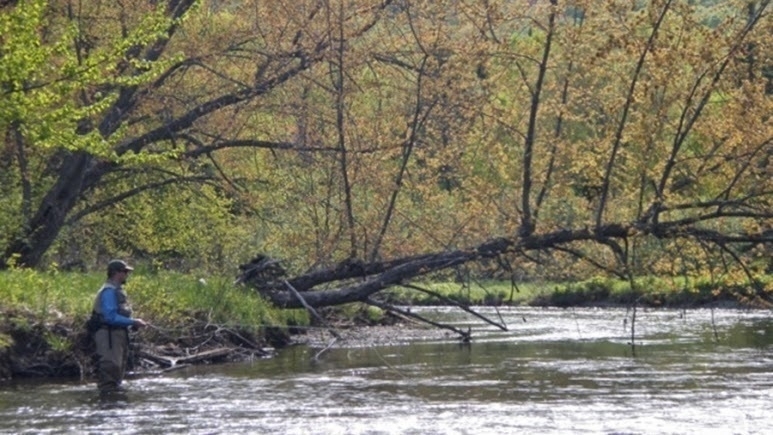 |
The focus of the course will be the char species of Alaska. These species, all members of the genus salvelinus, are commonly thought of as trout. Brook trout and lake trout are both char, as are Dolly Vardens and arctic char.
These are beautiful fish. I think many anglers love them simply because they are so beautiful to look at. When I pull one from the water I am immediately torn between wanting to hold this precious thing closely and the urge to release it immediately, before my coarse hands pollute its loveliness. The name "char" might come from Celtic roots, like the Gaelic cear, meaning "blood." They are more multi-hued than rainbow trout. The red on their sides and fins catches the eye and holds the gaze.
Over the years I spent researching and writing my own book on brook trout, I did a lot of reading. Some books call me back again and again, like Henry Bugbee's The Inward Morning and Steinbeck's Log From The Sea of Cortez. Neither one is chiefly about fly-fishing or about trout, but they're both written in a way that makes me re-think how I view the world. And they do both talk a good deal about fish, and fishing.
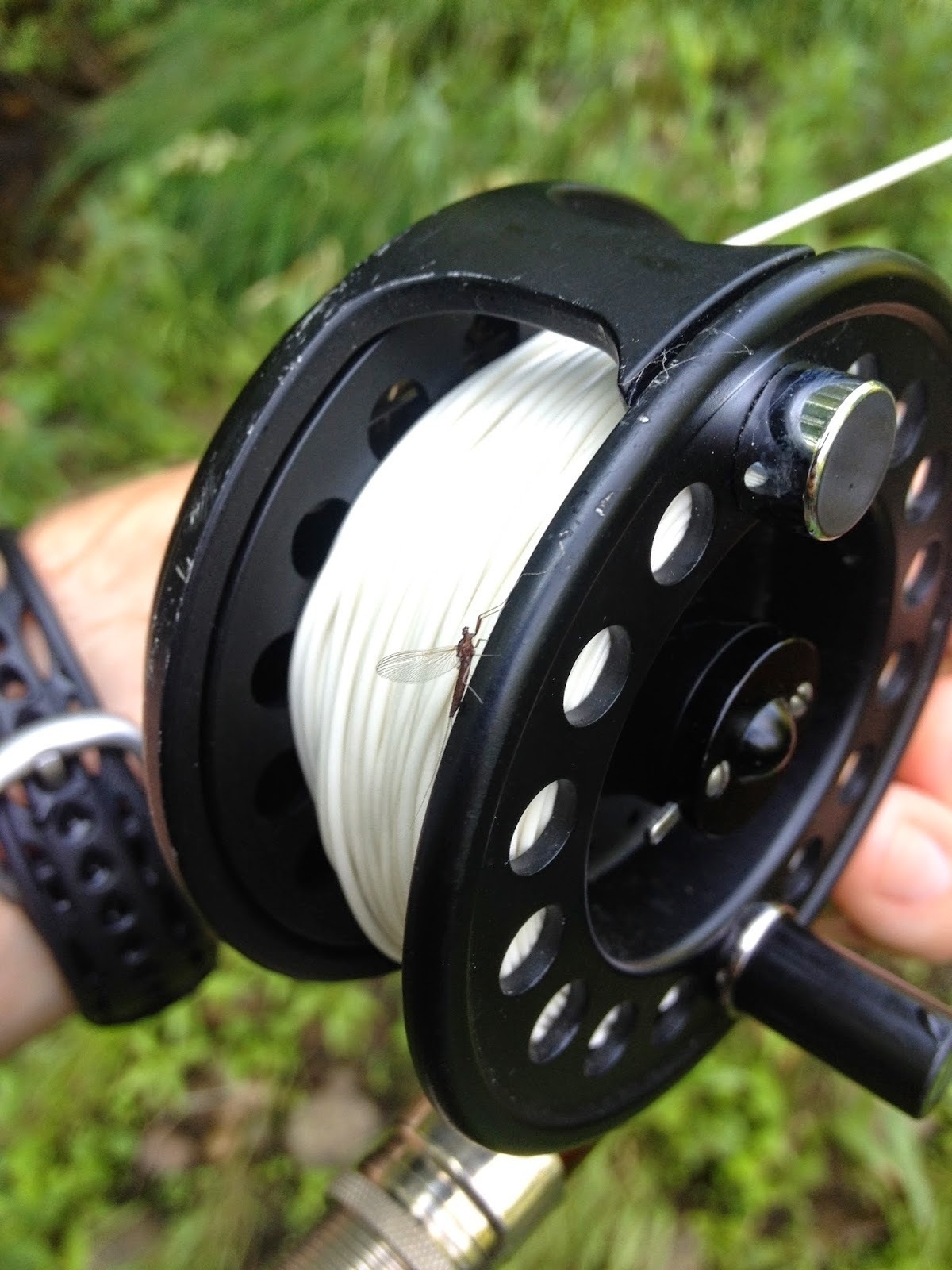 |
| Mayfly on my reel. Summer 2014, Maine. |
If the point of writing books about fish is to give techniques, or data, then we don't need many at all. But stories about fish and fishing are rarely about the taking of fish. More often they are about the states of mind that open up as we prepare to enter the water, or as we stand there in the river. Fishing is to such states of consciousness what kneeling is to prayer; the posture is perhaps not essential, but it is a bodily gesture that does something to prepare us to be open to a certain kind of experience. I won't belabor this point. Read my book if you really want me to go on about fishing and philosophy. For now, let me present some of my recommendations, plus the recommendations I've received:
On Nature
I teach environmental philosophy and ecology, so I begin with some orienting books.
Some Favorites
Classics
These have been recommended time and again. I'm not sure many people ever actually read the first two, though they become prized volumes in the libraries of anglers around the world.
Most Recommended
Fly-Tying
Places
One reason why there is so much writing about fishing is that fishers tend to be students of particular places. Yes, some people fish by indiscriminately approaching water and drowning hooked worms therein, but experience tends to cure most young anglers of that method. Fishing puts us into contact with what we cannot see (or cannot see well) under the water; experienced anglers learn to read the signs above the water and the place itself. We return to the same place as we return to beloved passages in books or to favorite songs, to know them better through repetition.
Other Frequent Recommendations
If I talk to a group of anglers about books for long enough, one or more of these will eventually be mentioned. Stylistically and in terms of content, they're quite different, but they all seem to speak to important moods and thoughts of anglers.
Other Recommendations
Most of these I don't know at all, so I'm not recommending them, just mentioning them. Of course, if you have more recommendations (or corrections), please feel free to add them to the comments section, below.
I'll conclude with a few other recommendations. First, when I've asked for recommendations about texts, a handful of people tell me "Tenkara." This isn't a text, but a kind of rod, and a method of fly-fishing. And yet people continue to say that word to me when I ask for texts. Why is that? I have a few guesses: there isn't a lot written about tenkara, but people who practice it have come to love its simplicity and grace. I'm not a tenkara fisher (yet) but I'm eager to learn. I have a feeling that tenkara, like so many spiritual practices or like some martial arts, is something that makes people feel they way great writing makes us feel: in it we transcend the immediacy of our environment.
Along those lines, one commenter on Facebook said this to me about my students: "Give them [a] fly rod and a stream and let them write [their] own story." There is wisdom here. It is one thing to read about waters, and quite another to enter the waters on one's own feet. Even so, I think it's important and wise to learn from those who've gone before us, too.
If you're interested in seeing some of my other book recommendations, have a look at this, this, and this.
Interview on SD Public Radio
Click here to listen to the whole interview.
Why Does A Philosophy Professor Write About Trout?
To this question I have three brief replies, which I'll say more about later.
The first is that this book really is about those things, even if it won't appear to be so at first blush.
The second is that in fact, I think more philosophers should turn our attention to the matter of lived experience, to our technology, to our tools, and to our ways of knowing the world. It's not enough to know things about the world; we ought to ask just how we know the things we know, and how our tools and our very modes of life and habits affect that knowledge. And everything that hangs on that knowledge.
And for my third brief reply, I turn to Edward Mooney, who, in his introduction to Henry Bugbee's beautiful book, The Inward Morning, recalls a question Martin Heidegger asked Bugbee in August of 1955: “What occasion prompts philosophical reflection?”
Mooney writes that no doubt Heidegger “anticipated a flat American response. Yet he found his question returned in a Socratic reversal. Bugbee simply asked, echoing a Basho haiku, 'Could the sound of a fish leaping at a fly at dawn suffice?'”
Theodicy and Phenomenal Curiosity
I should stop writing, stop looking at the screen, but I want, as Bugbee says in the first page of The Inward Morning, to "get it down," to attend to this moment as its own revelation. I want, in a way, to put this idea to the test. I can write and think when I am feeling well, but it is hard to write in times like this.
Life is interesting. This, too, is an interesting moment, and this pain is interesting.
The urge to turn this into a rule for others is to be resisted. My pain is interesting to me because I have chosen to make it so. I have chosen to be curious while I am able. And this is not the worst headache I've had, it's just strong and annoying.
But -- and this is the important thing, I think -- I must not insist that others do the same. I must not say that "pain is God's megaphone to rouse a deaf world," I must not say that "all things work together for good," that pain is all part of a bigger plan.
I admit that all of that may be true. It may be that the suffering of others will be the darkness that makes the brightness of the divine and eternal chiaroscuro shine brighter.
But to insist that pain is good is the privilege of those who are in no pain and the blasphemy of those who have forgotten fellow-feeling. It is lacking in sympathy, and in kindness. It is, in short, lacking in love.
In one of his letters to the church in Corinth, St. Paul wrote something like this: no matter what I say, no matter how beautifully I say it, if I speak without love, I might as well not be speaking at all. (I am paraphrasing, so if you're someone who's bothered by people paraphrasing the Bible and want to see his words, here you go.)
I cannot write any more right now.
*****
It is now several days later, and the pain is gone. Which means that now, when I think of the pain, I do so through the watery filter of time, which bends and distorts the image like water bending the image of the dipped oar. I no longer behold it as I did when I was in medias res, in the midst of things. I'm glad it doesn't hurt, but I've got to remember not to make it seem easier than it was.
Years ago a surgeon cut me open "from stem to stern" (his cheerful words, not mine) and then stapled me back together. I awoke barely able to breathe. The painkillers they gave me didn't remove the pain, they only relocated it to a part of my brain that cared less, made it less the center of my attention. Even there, it constantly tried to crawl back into the center, to take over my consciousness. I'm grateful that it did not last long. My awareness of that gratitude gives me great sympathy for those who cannot make their pain end, who have no hope that soon the healing will make the pain a dull memory rather than a sharp presence goading their consciousness.
At the time, I found it a helpful strategy to attend to the pain as a curiosity, to tell myself "this is interesting," and to ask "what can I learn from this pain right now?" I couldn't sustain this for long, but I could do it again and again, with ever-renewed curiosity, and I found enormous solace and spiritual interest in it. It put me above my pain, and stripped my pain of its domineering attitude. It no longer loomed over me while I gazed down at it with wondering eyes.
But again, this is extremely difficult to sustain, and it probably takes a certain weird, philosophical warp of mind to begin with, a phenomenal curiosity cultivated and strengthened by long habit well before the pain began. It's hard to come up with something like this in the moment agony strikes.
*****
The upshot of all this, for me, is twofold: first, it is good to have discovered, in the midst of my own pain, that I may always regard my own life as interesting, no matter what happens. Second, I must always remember that this is a curious discovery I have made about myself, not a universal fact for all people.
Of course, I am writing my discovery down here because I hope that it will prove true for others. And I think its greatest application is not for the destruction of sharp physical pain but for addressing the flat white pain of boredom. When boredom drops down from above and wraps us in its gauzy, nauseating silk, this, too, can become the object of our curiosity. The very fact of our boredom may be examined, and examined profitably.
But in all our examinations, we must not be - we must never be - unkind by despising the pain of others, dismissing it and insisting that if we can dismiss it, they can too.
Three Words About Writing: Plato, Emerson, Bugbee
(To paraphrase Thoreau, there are nowadays plenty of philosophy professors, but not so many lovers of wisdom.)
Instead, I offered a reflection on three ideas that matter for me as I write. Here are three that I keep coming back to:
First, a word from Plato: "Follow the argument wherever it leads." And try to find good interlocutors. If you surround yourself with people who say "yes" to everything you say, your writing and your thinking will both atrophy. If the trail leads uphill, it's no good to stay on the level path. Plato seems to have used writing as a way of sketching out how one might begin to solve problems. He didn't give answers so much as good questions. His dialogues survive because they are such good invitations for us to try to work out the solutions ourselves.
Second, Emerson: Your journals are your savings accounts. Your life is the way you earn deposits. "If it were only for a vocabulary the scholar would be covetous of action," he wrote. "Life is our dictionary." Without action, there is no experience; and without experience, the writer's vocabulary becomes continually narrower. Emerson wrote in fragments - very short essays, or sentences - in his journals, and when he sat down to write his essays and lectures, he found those fragments to be a rich vein of inspiration and even of finished work.
Finally, Bugbee: "Get it down." Write forward; don't edit too much. Keep writing, and as much as possible, write the way it comes. Attend to experience as it is given, without trying too hard to color it or shape it. Practice seeing, and seeing honestly, and write what you see.
This isn't by any means a whole course in writing, but it is a place to start. And often, that's what writers need: to start.
Then keep writing.
So, How's The Sabbatical Going?
Sabbaticals and Long Service Leaves
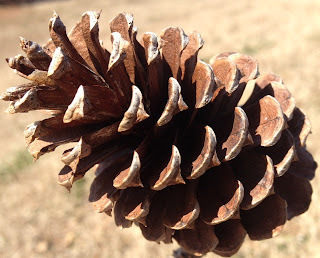 |
| Sabbaticals can be seasons of letting dry husks bear new life. |
Most jobs in the United States don't offer sabbaticals, but I'm fortunate enough to have one that does. Sometimes my kids chide me for choosing a job with relatively low pay, but self-regulated time is something money can't easily buy. I think I chose my career pretty well.
I say "self-regulated time" because my sabbatical isn't early retirement or a long vacation. My job as a college professor has three basic components: teaching, scholarship, and service. A sabbatical frees me from the first of those components, and from parts of the third. More precisely, it frees me from the daily tasks of teaching and service, but I expect that at the end of this year I will be a better teacher because I've had time to do research and to tear down and rebuild some of my classes. And any college capable of taking the long view knows that faculty who take sabbaticals can render better service over the long haul.
What I've been doing
To the casual observer it probably looks like I've spent a lot of time in coffee shops and airports, and not much else. For the last three years I've devoted myself to teaching and service, giving only a little of my time to scholarship. So when I began my sabbatical my scholarly life felt like deep waters pent up behind a strained dam. Over the last few years I've sketched out five books and seven articles and book chapters. Over my sabbatical I hoped to get maybe one book and a couple of articles done. That may not sound like much, but it's fairly ambitious, given how much time it takes to do the research and to write well.
Since my job description breaks down into the three parts I mentioned above, let me say a few words about what I've been doing this year in each of those areas.
Writing: As for academic writing, so far, I've completed one book (on brook trout), and made significant progress on two others (both on the philosophy of religion). Once I get them done, books four and five are ready to go, too. I've submitted one book chapter for someone else's book, and I'm about to submit another. I've written a few book reviews for popular and scholarly journals, too. Last week I gave a lecture at the College of William and Mary on war and evil. Now I'm preparing that lecture for publication as a journal article. By the time this sabbatical is over, I hope to have at least one book under contract and two more articles sent off for review. I've also done some more popular writing, including a couple of articles on virtue ethics in the Chronicle of Higher Education's Chronicle Review - one on guns and one on the ethics of drones or UAVs. Perhaps most importantly, I've been writing every day. As you can see, I've been trying to write quickly here on this blog a couple of times a week, and I've been writing in a lot of other places as well. Like any other skill, it comes more fluidly with practice.
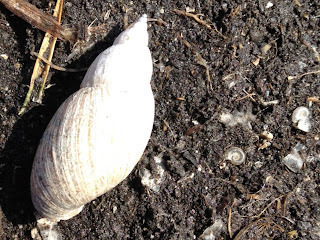 | ||
| Snail shells grow by slow accumulation, as habits do. |
Service: Even though I'm away from campus, my heart is still there. Everything I do as a professor winds up leaning back towards the classroom, which means towards my students. Nothing I do matters more than the people I do it with and for, I think. I must have written sixty letters of recommendation for students this year (which is more time-intensive than one might think). Sabbatical has also given me the chance to help some colleagues here and at other universities. I've been helping half a dozen friends who teach Classics, Philosophy, and Biology at other universities by reading and commenting on drafts of their essays and books. And I've done a lot of "double-blind" reviewing for six or seven academic publishers who want advice on whether to publish certain books or journal articles. Best of all has been time to collaborate with colleagues in far-off places, corresponding with professors and graduate students around the world about philosophy, ecology, Scriptural Reasoning, Henry Bugbee, Charles Peirce, C.S. Lewis, and other matters close to my heart. I list this as "service" but I could just as well call it "ways I've learned from other people far away."
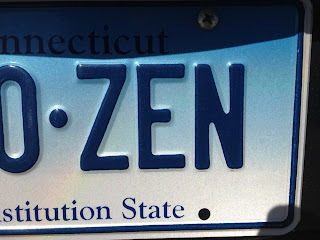 |
| The license plate on the rental car I had at a recent conference. |
Yes. The word "sabbatical" has its roots in a Hebrew word, shabbath, meaning "to rest." It would be a shame not to use the time to get some rest. Last summer I spent two weeks in a writing retreat sponsored by Oregon State at their Shotpouch Creek Cabin with my friend and co-author Matthew Dickerson. We were working, but what restful work it can be to live, think, and write quietly with a friend. We spent half of each day writing, and the other half talking, hiking, fishing, wading in the ocean. We borrowed some hymnals from an Episcopal church in Eugene and spent part of each evening singing as the sun declined behind the coastal range.
On my way to Oregon, I drove my sons to the coast last summer to look at colleges, to go whale-watching, and to watch some professional soccer matches. When I got home to Sioux Falls, I joined a gym and I became my son's rec league soccer coach. This is his last year of living at home with us, and I can't tell you how grateful I am to have this time with him before adulthood takes him off on the next leg of his life's journey. Despite all the work, and travel, and writing, I've had more time with my wife and my kids, and more time for self-care. I feel much healthier and fitter now than I did a year ago. I have a feeling my family is better off for that, too.
I wish everyone, regardless of their line of work, could have an experience like this every few years. It might remind us all what matters. It's expensive, I know. I took a hefty pay cut from an already modest salary to have this year off, and thankfully our savings have been enough to get us through. (And writing and lecturing makes me a few extra ducats to send to my daughter in college from time to time or to spend on my boys at home.)
No doubt some people will read this and wonder why my college is willing to pay me anything at all when I'm not showing up to work. The answer is that some colleges still take the long view. You have to put aside your monthly planner and get a calendar that measures time and value "not by the times but by the eternities" (pace Thoreau), that looks down the years the way a carpenter holds a plank to her eye and looks down the full length of the board rather than seeing only the grain of what is nearest. Money has been spent on me this year by people who thought it worthwhile to let me stretch from my cramped pose. They have let me drink from distant streams so that I can come back nourished not just by the Big Sioux and the Missouri but by the waters of Oregon and New York and Virginia - and in some sense by the Hippocrene itself.
So that's what I've been doing. I'm sorry I haven't been around campus much. In the long run, what I've been doing should make my return to campus a very good one indeed. I can't wait to tell you more about what I've learned this year once I return.
Future Hopes, Present Experience, and the Wisdom of the Past
Bugbee writes: "Of experience...we may hope for understanding in our own time, and in this we do not seem to have the edge on preceding generations of men."
Science grows from one generation to another. What we know is more advanced than what previous generations knew. But precisely because of this, we are alienated from what science will know, what it aims to know when it reaches its goal. Science uses experience, it swims in the medium of experience on a long-distance swim. We are like generations of migratory butterflies, none of us making the whole journey, but each of us making part of it so that the next generation may fly further. Standing on one another's shoulders we become the giants upon whose shoulders our intellectual descendants may stand.
At first blush, experience seems less worth knowing, since it is subjective, unquantifiable, subject to the winds of time and the diurnal tides of the chemistry of our blood. But experience is immediate. No generation is privileged; every generation receives the same share. Here our knowledge is not a deposit that we hope will gain interest for our children; it is something in our hands and for us now. The wisdom of the past does not advance the next generation so much as clarify our own.
Bugbee again: "It is not a question of our beginning from where they leave off and going on to supersede them. We are fortunate if we can become communicant in our own way with what they have to say."
Tradition has roots that mean handed-down. Bugbee reminds me, gives me words to articulate, why it is worth continuing to try to read ancient wisdom. He reminds me why, when I could have chosen to work in science, it is not a bad choice to work as a teacher, priest, curator, historian, poet, librarian - a custodian of the narratives of experience. Science aims forward beyond our lives; but experience is here now, where we live. Is it such a bad thing to live here and now?
Philosophy Begins in Wonder
It has since been noted that philosophy aims at the conclusion of wonder. This, unlike the first statement, might not be correct.
So much depends on what we understand the aim of philosophy to be. If we model it on the applied sciences, then its aim is to solve particular problems, in which case it aims to be done with its work. The conclusion of a chain of reasoning becomes its consummation, and the consummation becomes the end.
But if philosophy should also aim to make us scientists as Peirce understood science - he says it is "the pursuit of those who desire to find things out" and something that is carried out in a community, not by an isolated individual - then it aims not just at solving problems but at introducing us to the world.
Bugbee points out (Inward Morning, August 31 entry) that in wonder, "reality has begun to sink into us." Think about it: when you really wonder at something, isn't it because of a disclosure? Wonder may seem to concern what is hidden, but the beginning of wonder is also the beginning of an opening, when the world opens to us. If it were not so, we would not even know to wonder.
Philosophy teaches us - or ought to teach us - to open ourselves in return. This opening of ourselves is not the conclusion of wonder but the development of the habit of wonder. I don't mean the slack-jawed laziness that poses as wonder and pretends that all things are wonderful while being open to none of them, but, as Bugbee puts it, a commitment to being in the wilderness and the patience to let ourselves be "overtaken...by that which can make us at home in this condition."
Faith, Hope, and Certainty
Bugbee and the Tillage of the Soul
In the opening entry of The Inward Morning, Henry Bugbee writes
Reading and Writing and Gratitude
It’s easy to get too busy to read, and too busy to write. My sporadic blog posting reflects the cycles of the academic year: some times I’m full of time to post and full of ideas for writing; other times, I’m simply too busy to write. Those too-busy-to-write times seem to come more often than the other times.
Still, I make myself promise to write – books, articles, reviews, essays – as a means of self-discipline. If I’m reading, I’m learning. If I’m writing, I’m learning even more.
But I am busy. So all this posting will do is acknowledge the giants upon whose shoulders I have been sitting this past week: Plato’s Phaedrus; Augustine’s City of God; Mooney’s Lost Intimacy in American Thought; West’s Prophetic Fragments and American Evasion of Philosophy; Apuleius' De Deo Socratis and his Asinus; a handful of Rorty’s essays; Royce’s Problem of Christianity; a handful of books on environmental philosophy (trying to sort out both some ethical issues and the practical matter of next spring’s syllabus!); and, as always, a smattering of Peirce.
No, I don’t usually read quite that many books in a week. (Actually, I think I’m leaving out a half-dozen or so - oh, yeah, there was some Rauschenbusch in there, and some Martin Luther King, too. Lots of social and political thought about religion, politics, freedom, and creativity, mostly.)
Last week was a marathon of reading and writing. The result was a book chapter and sketches of about ten other articles. Not sure they’ll all get written - I only have so much time, remember? But the most important part of this has been not the words on the page, but the way those words have served as a tool for thinking. For that, and for the life that allows me to do that at all, I am very, very grateful.
